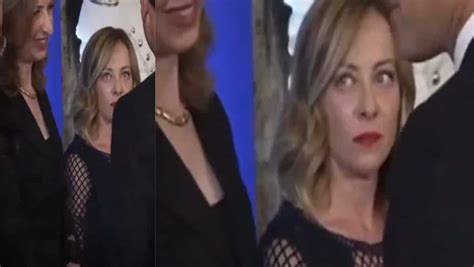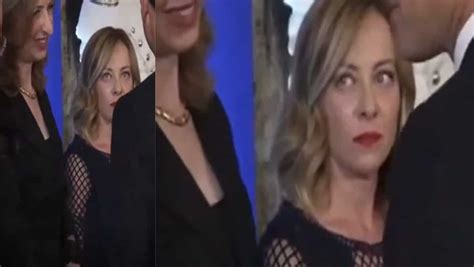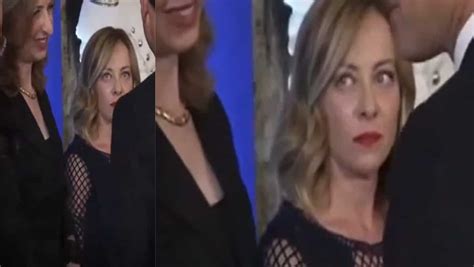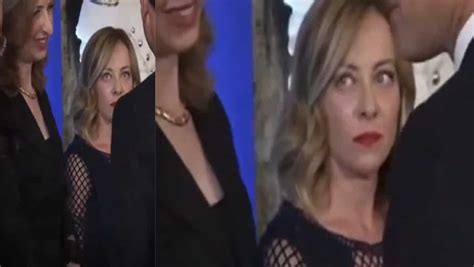
Italian Prime Minister Giorgia Meloni’s apparent eye roll during a conversation with French President Emmanuel Macron at the G7 summit in Italy has sparked widespread attention and commentary, becoming a viral moment that underscores underlying tensions despite the display of unity.
The incident, captured on video and widely shared on social media, occurred as leaders gathered for a group photo at the summit held in Apulia. While the exact content of Macron’s whisper remains unknown, Meloni’s reaction – a distinct eye roll and a slight smile – has been interpreted by many as a sign of disagreement or perhaps even exasperation with the French President. The moment adds a layer of intrigue to the dynamics between two of Europe’s most prominent leaders, representing different ends of the political spectrum.
Meloni, leader of the right-wing Brothers of Italy party, and Macron, a centrist, have had a complex relationship marked by both cooperation and differing views on key issues such as immigration, economic policy, and the role of the European Union. Their interactions are closely watched as they navigate the challenges facing Europe and the world. This particular interaction, amplified by social media, has further fueled speculation about the state of their working relationship and the broader political landscape within the European Union. The incident highlights the scrutiny that political leaders face in the digital age, where fleeting moments can be magnified and analyzed for deeper meaning.
The G7 summit, an annual gathering of leaders from the world’s most advanced economies, is intended to foster collaboration and address pressing global issues. However, behind the carefully constructed image of unity, differences in opinion and approach often exist. Meloni’s eye roll serves as a reminder of these underlying tensions and the complex dynamics that shape international relations. Whether the gesture was merely a fleeting reaction or a sign of deeper discord, it has undoubtedly captured the public’s attention and added a new dimension to the ongoing dialogue between Italy and France.
Context and Background
Giorgia Meloni’s rise to power in Italy marked a significant shift in the country’s political landscape. As the leader of the Brothers of Italy party, she campaigned on a platform of national conservatism, emphasizing border control, traditional values, and a more assertive role for Italy on the world stage. Her victory in the 2022 general election made her Italy’s first female prime minister and signaled a broader trend of right-wing populism gaining traction in Europe.
Emmanuel Macron, on the other hand, represents a more centrist and pro-European vision. Since becoming President of France in 2017, he has championed greater European integration, economic reform, and a strong Franco-German partnership as the engine of the European Union. Macron’s focus on strengthening the EU’s global influence and promoting multilateralism often puts him at odds with more nationalist-leaning leaders like Meloni.
The relationship between Italy and France is historically significant and deeply intertwined, but it has also been marked by periods of tension. The two countries share a long border, close economic ties, and a common cultural heritage. However, they also have differing perspectives on issues such as migration, energy policy, and defense spending. These differences can sometimes lead to friction, particularly when the leaders of the two countries represent opposing political ideologies.
Policy Differences and Areas of Tension
Several key policy areas have contributed to the complex dynamic between Meloni and Macron. One of the most prominent is immigration. Meloni has taken a hard-line stance on border control, advocating for stricter measures to prevent illegal immigration and calling for a renegotiation of EU asylum policies. Macron, while also advocating for stronger border security, has emphasized the need for a more humane and coordinated approach to migration, including burden-sharing among EU member states.
Another area of disagreement is economic policy. Meloni’s government has pursued a more nationalistic economic agenda, prioritizing Italian interests and seeking greater autonomy from EU regulations. Macron, on the other hand, has championed fiscal discipline and structural reforms within the Eurozone, often clashing with Italy over issues such as budget deficits and public debt.
The two leaders also have differing views on the future of the European Union. Meloni has expressed skepticism about further European integration, advocating for a more intergovernmental approach that respects national sovereignty. Macron, in contrast, is a strong proponent of deeper integration, calling for greater cooperation on issues such as defense, energy, and technology.
Reactions and Interpretations
The viral video of Meloni’s eye roll has generated a wide range of reactions and interpretations. Some observers have interpreted it as a sign of disrespect towards Macron, reflecting underlying tensions between the two leaders. Others have downplayed the incident, suggesting that it was merely a fleeting moment of exasperation or a harmless reaction to something Macron said.
Political commentators have offered various explanations for Meloni’s reaction. Some have suggested that it was a deliberate attempt to signal her disagreement with Macron’s policies or to appeal to her nationalist base. Others have argued that it was simply a spontaneous reaction, reflecting the pressure and scrutiny that political leaders face in the public eye.
Social media users have also weighed in on the incident, with many offering their own interpretations and opinions. Some have praised Meloni for standing up to Macron, while others have criticized her for being disrespectful. The incident has sparked lively debates about the relationship between Italy and France, the role of the European Union, and the broader political landscape in Europe.
Implications for Italy-France Relations and European Politics
The incident, while seemingly minor, has the potential to further strain relations between Italy and France. It also underscores the broader challenges facing the European Union, as member states grapple with differing priorities and ideologies.
The relationship between Italy and France is crucial for the stability and prosperity of Europe. The two countries are major economic partners, sharing close cultural ties and a common interest in addressing regional and global challenges. However, their relationship has been tested in recent years by disagreements over issues such as migration, economic policy, and the future of the EU.
The incident could also have implications for the broader political landscape in Europe. The rise of right-wing populism in countries like Italy has challenged the traditional dominance of centrist and pro-European forces. The tensions between Meloni and Macron reflect this broader ideological divide and the challenges of forging consensus on key policy issues.
The Role of Social Media in Amplifying Political Moments
The fact that Meloni’s eye roll went viral highlights the growing role of social media in shaping public perceptions of political leaders and events. In the digital age, fleeting moments can be captured, amplified, and analyzed in ways that were never before possible.
Social media can be a powerful tool for holding political leaders accountable and promoting transparency. However, it can also be used to spread misinformation, fuel polarization, and distort public discourse. The incident underscores the importance of critical thinking and media literacy in navigating the complexities of the digital age. It also highlights the need for political leaders to be aware of the potential impact of their actions and words, as they are constantly under scrutiny in the public eye.
Potential Outcomes and Future Scenarios
Several potential outcomes could arise from the incident and its aftermath. One possibility is that the tensions between Meloni and Macron could escalate, leading to a further deterioration in relations between Italy and France. This could have negative consequences for European cooperation on key issues such as migration, economic policy, and security.
Another possibility is that the two leaders could attempt to downplay the incident and find common ground on areas of mutual interest. This could involve compromises on policy issues or a renewed commitment to dialogue and cooperation.
A third possibility is that the incident could have little long-term impact on relations between Italy and France. Both countries have a strong interest in maintaining a stable and productive relationship, and they may be able to overcome their differences in the pursuit of shared goals.
Ultimately, the future of Italy-France relations will depend on the willingness of Meloni and Macron to engage in constructive dialogue and find common ground on key policy issues. It will also depend on the broader political context in Europe and the challenges facing the European Union.
In Conclusion
Giorgia Meloni’s eye roll during a conversation with Emmanuel Macron at the G7 summit has become a symbol of the complex and sometimes fraught relationship between Italy and France. The incident, amplified by social media, underscores the underlying tensions and differing ideologies that shape the political landscape in Europe. While the long-term implications remain uncertain, it serves as a reminder of the challenges of forging consensus and maintaining unity in a world of diverse perspectives and priorities. The incident also highlights the increasing scrutiny faced by political leaders in the digital age, where fleeting moments can be magnified and analyzed for deeper meaning. How Meloni and Macron navigate their relationship in the coming months and years will have significant implications for the future of Europe.
Frequently Asked Questions (FAQ)
-
What exactly happened between Giorgia Meloni and Emmanuel Macron at the G7 summit?
At the G7 summit in Apulia, Italy, a video surfaced showing Italian Prime Minister Giorgia Meloni appearing to roll her eyes while French President Emmanuel Macron was speaking to her. The exact content of their conversation is unknown, but Meloni’s reaction has been widely interpreted as a sign of disagreement, exasperation, or disapproval of Macron’s remarks. This brief interaction, captured on video and shared extensively on social media, quickly became a viral moment, drawing attention to the dynamics between the two leaders. While neither leader has publicly commented on the specific exchange, the incident has fueled speculation about their working relationship and broader political tensions between Italy and France.
-
Why is this eye roll considered such a big deal?
The eye roll has gained significance for several reasons. Firstly, it involves two prominent European leaders representing different political ideologies: Meloni, a right-wing conservative, and Macron, a centrist. Their differing viewpoints on key issues such as immigration, economic policy, and European integration often create friction. Secondly, the incident occurred at the G7 summit, a high-profile international event designed to project an image of unity and collaboration among world leaders. Meloni’s apparent display of disagreement undermines this image and highlights the underlying tensions. Thirdly, the viral nature of the video amplifies the incident, turning a fleeting moment into a subject of widespread public discussion and scrutiny. It serves as a reminder of the constant surveillance and potential for misinterpretation that political leaders face in the digital age. The seemingly small gesture has resonated because it symbolizes larger political and ideological divides within Europe.
-
What are the main policy differences between Meloni and Macron?
Giorgia Meloni and Emmanuel Macron hold differing views on several key policy areas. Immigration is a major point of contention, with Meloni advocating for stricter border controls and a more assertive approach to preventing illegal immigration, while Macron favors a more coordinated European approach that includes burden-sharing. In terms of economic policy, Meloni’s government has pursued a more nationalistic agenda, prioritizing Italian interests and seeking greater autonomy from EU regulations, while Macron champions fiscal discipline and structural reforms within the Eurozone. On the future of the European Union, Meloni has expressed skepticism about further integration, preferring a more intergovernmental approach, while Macron is a strong proponent of deeper integration and greater cooperation. These policy differences contribute to a complex dynamic between the two leaders and their respective countries.
-
How could this incident affect the relationship between Italy and France?
The eye roll incident could potentially strain the relationship between Italy and France, although the extent of the impact remains to be seen. At a minimum, it has publicly highlighted the ideological differences between the two leaders. More significantly, it could exacerbate existing tensions over policy issues such as immigration, economic governance, and EU integration. A deterioration in relations could hinder cooperation on these and other important matters, affecting the stability and prosperity of Europe. However, it’s also possible that both leaders will attempt to downplay the incident and focus on areas of mutual interest, seeking to maintain a productive working relationship despite their differences. The long-term impact will depend on their willingness to engage in constructive dialogue and find common ground. It is also dependent on the responses from each country following the media coverage.
-
What does this incident say about the current state of European politics?
The incident reflects the broader political landscape in Europe, which is characterized by increasing polarization and the rise of right-wing populism. Meloni’s government represents a shift towards national conservatism in Italy, while Macron embodies a more centrist and pro-European vision. The tensions between these two leaders symbolize the ideological divisions that are prevalent across the continent. The incident also underscores the challenges of forging consensus and maintaining unity within the European Union, as member states grapple with differing priorities and ideologies. The amplification of the incident through social media highlights the growing role of digital platforms in shaping public perceptions and influencing political discourse. The current state of European politics is marked by a complex interplay of national interests, ideological divides, and the ever-present influence of social media.









